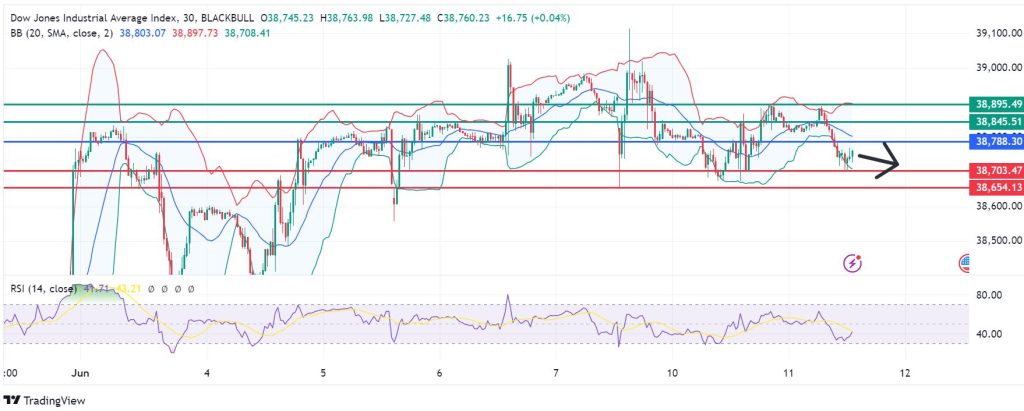- Summary:
- The Dow Jones Index is likely to see limited gains as the excitement around earnings and tech cools off and interest rate worries set in.
The Dow Jones Index slid in the premarket session on Tuesday as investors positioned themselves for the Fed’s interest rate decision and CPI figures release. The Index was down by 0.33 percent at the time of writing to register 38,738 points. The trajectory is likely to continue in the near term, as the market anticipates the Fed to retain interest rates at 5.25-5.50 percent. Higher-for-longer interest rates could take their toll on the US business environment.
Most of the top ten Dow Jones stocks are flashing red. UnitedHealth was down by 0.5 percent in Tuesday’s premarket session, erasing a substantial part of the gains made on Monday. Microsoft, the Dow’s third-largest stock by weight, was up by 0.95 percent in the session, mirroring Monday’s gains. Apple’s uninspiring show at the Worldwide Developers Conference continued to erode the share price, as it traded at -0.20 percent in the premarket. Home Depot followed a similar trajectory, going down by 0.37 percent in the premarket session.
Could we see NVIDIA in the Index?
The Dow Jones Index is unlikely to return to the trajectory that saw it hit a record 40,000 points in May. That is because the market sentiment is increasingly becoming bland, as major earnings reports have already been released, and the AI hype around tech stocks seems to have been locked in. Furthermore, the most-talked-about company in the tech market, NVIDIA, is not part of the Index.
That said, the company’s ten-for-one stock split on June 7 has raised the prospects of the company being included in the Index. However, its inclusion on the Index could displace another chipmaker, Intel, which currently has the lowest weighting. It could also potentially affect the Dow Jones Index performance, given NVIDIA’s market cap and the current bullish sentiment around its stock.
Technical analysis
The momentum on the Dow Jones Index currently signals that the sellers are in control, with the pivot point at 38,660. The downside is likely to continue if resistance persists at that level, and the first support will likely be at 38,610. However, an extension of control by the sellers could break the support and build the momentum to test 38,550. Alternatively, a break above 38,660 will signal control by the buyers, who will likely encounter another resistance at 38,685. Extended control by the buyers will breach the resistance and invalidate the downside view. Also, such a move could result in further upside advances to test 38,720.



